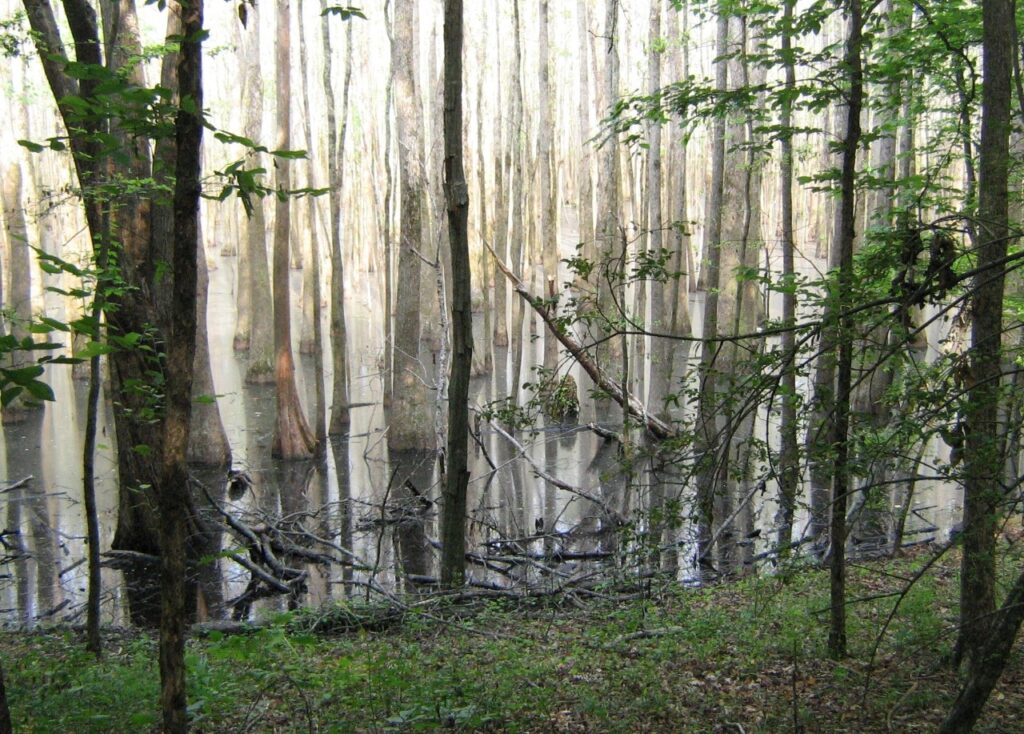
Wetlands weave between land and water, connecting invisible threads in nature while teeming with plants and wildlife. These spongy soils absorb floodwaters and are considered among the most biodiverse habitats on Earth — and the most vulnerable.
In Tennessee, wetlands cover just 3% of the state, and more than half of these ecosystems may soon be in the path of construction.
Lawmakers are considering a bill that would remove state protections that limit development on ephemeral waterways and “isolated wetlands,” a misnomer for wetlands that do not have obvious connections to surface waters like rivers.
Tennessee has about 780,000 acres of wetlands, and the legislation targets about 430,000 of these acres, including about 90,000 in Middle Tennessee.
Critics say this bill would benefit developers while causing serious ecological and economic consequences for the state.
The lawmaker pushing the legislation is a developer
Rep. Kevin Vaughan, R-Collierville, is a developer and sponsor of the bill. He has suggested that the bill was based on his personal experiences with the Tennessee Department of Environment and Conservation, or TDEC — the agency that issues wetland permits.
“Your land and your rights for your property are taken from you,” Vaughan said during a hearing on the bill on Feb. 6. “This is the thing that rubs me rawer than anything about this topic.”
Vaughan has been affiliated with at least four projects by Crews Development involving wetlands in recent years. In 2019, the company got caught by state regulators for draining and filling a wetland without a permit — TDEC cited a call with Vaughan “on behalf of Crews Development” in a Notice of Violation. Collectively, these four projects could have saved upwards of a hundred thousand dollars if Vaughan’s proposed legislation existed at the time.
Vaughan did not respond to a request for comment from WPLN about whether these projects represented a conflict of interest or if he had a personal financial motivation to propose the legislation.
 Courtesy National Park Service
Courtesy National Park Service Wetlands are vulnerable to urban development.
Most of the lawmakers involved in the bill work in the same industry. One of the co-sponsors, Rep. Jeff Burkhart, is the former president of the Tennessee State Home Builders Association. Reps. Todd Warner, Tim Hicks and Ryan Williams work in the construction industry.
If the bill passes, experts say a small number of people will make short-term profits while causing long-lasting harm to communities and ecosystems. “The legislature is in this position, when this bill is in front of them, of whether they’re going to look out for the public good,” said Alan Leiserson, a retired attorney with TDEC.
To build in the state, people apply for a permit with TDEC. For developers, this process involves having their property examined for wetlands. If wetlands are found, the state analyzes their worth and may decide that developers cannot build on part of their property or they can only build if they pay for mitigation elsewhere. There can be costs to a developer in either time, restricted property uses or fees.
For society, there is also a cost.
Wetlands reduce flooding
Wetlands have been estimated to be worth between about $8,000 and $19,000 per single acre, according to analysis by the University of Tennessee, Knoxville, which researchers warn “only provides an estimate of the true underlying value.” Their single greatest utility is attributed to the moderation of extreme events. For example, a wetland’s soil can reduce the speed of floods by absorbing water — potentially holding days or weeks of floodwaters.
 Courtesy Peter Paplanus
Courtesy Peter Paplanus Upland chorus frogs often live in temporary wetlands.
Small impacts to these natural mitigation systems could have big impacts on floods, according to Alex Pellom, the chief of staff at the Tennessee Emergency Management Agency.
“If we’re not having to study it, and we’re not having to permit it, I don’t know that we would know what the effects are until it’s too late…until we see flash flooding,” said Pellom, who cited examples of developments leading to increased floodwaters on nearby properties.
Flooding is considered the top hazard in Tennessee, and changes in the climate and land have made it more destructive in recent decades. Between 1996 and 2022, flooding caused about 60% of all property damage in the state, according to Pellom.
Vaughan said that he had “no concerns about this bill affecting flooding” during a hearing on Feb. 6 — which isn’t the first time Vaughan has attacked environmental regulations or rejected the findings of expert testimony. Back in 2022, he sponsored the now law that prevents local governments from blocking fossil fuel projects.
Wetlands affect water, biodiversity and climate
The most basic definition of wetlands is soil that is at least periodically saturated or covered by water. Wetlands include marshes, bogs and swamps, and they house unique plants.
In Tennessee, wetlands are connected to mountains, caves and some of the most biodiverse rivers on the continent.
 Courtesy Justin Campbell/Unsplash
Courtesy Justin Campbell/Unsplash Tennessee is geologically diverse, boasting mountains and caves.
Wetlands help purify water, as these soils hold water in a relatively still environment before water migrates into groundwater, aquifers or nearby surface waters like rivers. This is especially important in West Tennessee for the Memphis Sands Aquifer recharge zone and in the limestone karst regions throughout Middle and East Tennessee.
“We have plenty of rivers and wetlands that are connected by groundwater because of our unique geology in Tennessee,” said Grace Stranch, the CEO of the Harpeth Conservancy.
Wetlands act as “carbon sinks,” absorbing carbon dioxide that would otherwise heat the planet, and house significant biodiversity.
Some folks compare their value to rainforests and coral reefs: Wetlands cover just 6% of Earth’s surface but support 40% of all plant and animal life.
And like those habitats — Stranch said wetlands are vulnerable to permanent loss, and Tennessee has already lost about 60% of its wetlands.
“Once you fill and pave the wetland, it’s gone,” Stranch said. “Because we have a unique ecosystem, it is our duty to protect it.”
Protecting what’s left
In 1971, Tennessee passed some laws to protect water, including wetlands, through the Tennessee Water Quality Act. The next year, the federal government passed its version, the Clean Water Act. People have been fighting over the legal definition of waters and wetlands ever since.
Last year, the Supreme Court ruled that the states had control in its decision on Sackett v. Environmental Protection Agency. This opened 2.5 million acres of wetlands to urban development and industrial agriculture, the second-largest source of damage to U.S. wetlands.
Agricultural organizations like the American Farm Bureau Federation, the American Sugar Alliance, the Fertilizer Institute and the National Corn Growers Association argued that the costs to protect wetlands hurt their profits. In addition to farmers and homebuilders, other industries that might drain wetlands include timber, mining and fossil fuel companies.
Many states now have little to no protections. Tennessee exempts agriculture from wetland laws, but the existing regulations for development stayed in place — making Tennessee one of the most protected states in the nation today.
‘The pending proposal is no compromise’
The legislation will be heard next by the Agriculture and Natural Resources Committee pending an amendment. During the hearing on Feb. 6, Vaughan introduced a proposed amendment that would have left all “low-quality” and up to 4 acres of “moderate” isolated wetlands unprotected per development project.
The proposed amendment does not solve the issues of the original legislation, according to George Nolan, the Tennessee director of the Southern Environmental Law Center.
“The pending proposal is no compromise and it does not protect Tennesseans and our natural heritage,” Nolan said. “With all due respect, the bill puts the interests of road builders and developers over those of future flood victims and Tennessee taxpayers.”

